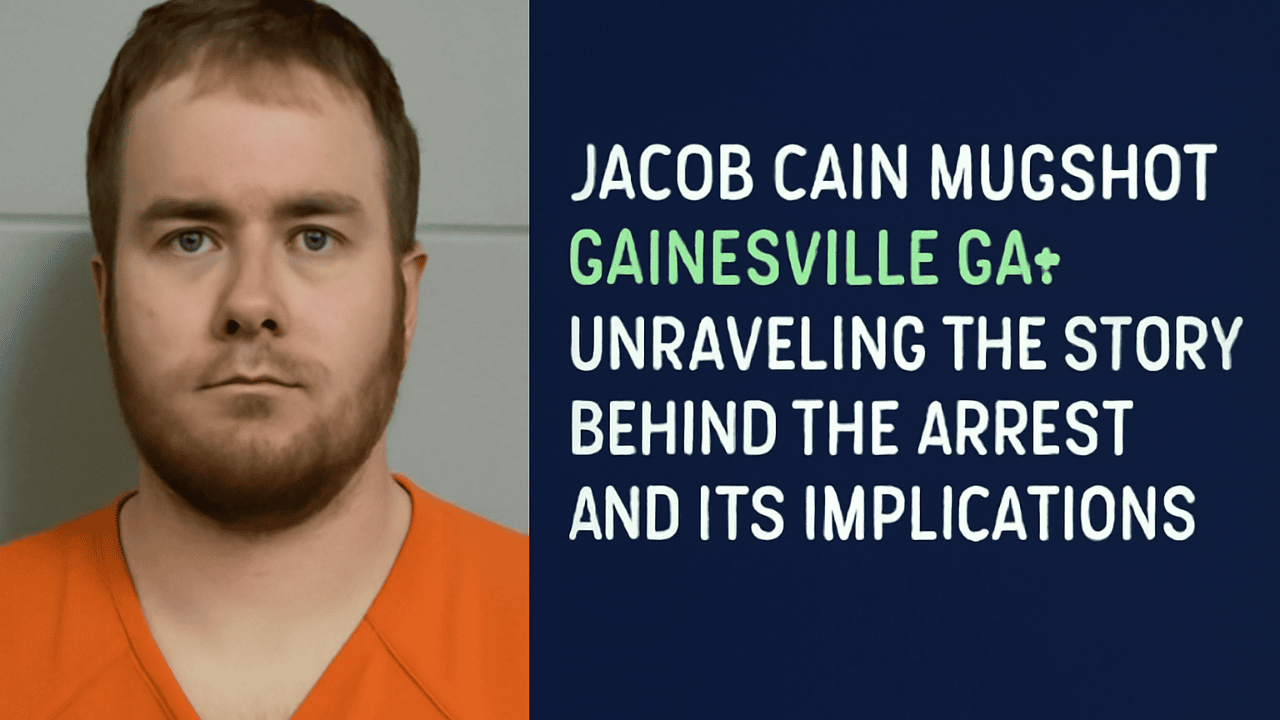The release of mugshots has sparked many debates over the years, with some questioning the ethical and legal implications of making these images public. One such case that garnered attention was the arrest of Jacob Cain, whose mugshot from Gainesville, Georgia, circulated widely after his arrest. In this article, we will delve into the specifics of the “Jacob Cain mugshot Gainesville GA” case, the legal framework surrounding the release of mugshots, ethical considerations, community reactions, and the broader implications of such incidents.
The Incident: Jacob Cain Mugshot Gainesville GA
Jacob Cain’s mugshot from Gainesville, Georgia, gained significant attention after his arrest in February 2023. According to the information available, Cain was arrested by the White County Sheriff’s Office on charges related to a probation violation. Specifically, Cain had a fingerprintable charge that led to his probation being violated. This arrest, along with the subsequent release of his mugshot, caught the attention of both local and online communities.
The arrest was part of the ongoing efforts by law enforcement to enforce probation terms, but the release of Cain’s mugshot sparked significant public interest. While mugshots are often considered public records in many states, the way they are distributed and accessed by the public remains a contentious issue. In Cain’s case, his mugshot was quickly made available to the public, leading to discussions about privacy, media ethics, and the potential consequences for individuals whose photos are shared widely before a court decision.
Legal Framework Behind Mugshot Release in Georgia
In Georgia, mugshots are generally considered public records under the Georgia Open Records Act. This law allows for the release of various records, including those related to arrests and bookings. As a result, the “Jacob Cain mugshot Gainesville GA” became accessible to the public almost immediately after his arrest. Under the law, the mugshot was subject to public access, which meant that news outlets, social media users, and various websites could easily distribute it.
While Georgia law supports public access to mugshots, it is important to note that there are exceptions and limitations to how these images can be used. For example, certain records may be withheld in specific cases, such as those involving juveniles or ongoing investigations. However, in most cases, mugshots are made available shortly after an arrest, which can sometimes lead to an unfair trial by media or public opinion before a person has even had their day in court.
This legal framework raises important questions about the balance between transparency and privacy. Jacob Cain’s case is a perfect example of how a simple mugshot release can have a significant impact on an individual’s reputation and privacy rights, even if they have not been convicted of a crime.
Ethical Considerations: The Impact of Early Mugshot Exposure
The release of Jacob Cain’s mugshot from Gainesville, GA, also raises several ethical questions. While it is legal for mugshots to be made public, there is an ongoing debate about whether this practice is fair to individuals who have not yet been convicted. The publication of mugshots can lead to immediate public judgment, which might not be fair, especially when the individual in question is still facing legal proceedings.
In Cain’s case, the rapid spread of his mugshot across social media platforms and news outlets could have led to an assumption of guilt. This is a significant concern, as it may influence the opinions of potential jurors or the general public. The ethical dilemma arises from the fact that, under the law, someone who has merely been arrested and not convicted of a crime can still have their image distributed to millions of people, sometimes leading to long-term damage to their reputation.
One of the primary ethical issues here is the presumption of innocence until proven guilty. Jacob Cain’s mugshot, though legally available, could have unfairly prejudiced people against him, even before the legal process had run its course. This ethical concern is particularly important when considering that many individuals arrested may never face charges or may be found not guilty, which raises the question of whether their mugshots should still be publicly accessible.
Community Reactions: The Public’s Response to the Jacob Cain Mugshot Gainesville GA
The release of Jacob Cain’s mugshot from Gainesville, GA, did not go unnoticed by the local community. As with many similar cases, members of the public voiced their concerns about the impact that such a widely circulated image could have on an individual’s life. Some community members expressed frustration over the seeming lack of privacy for individuals involved in legal cases.
In many cases, local residents are particularly sensitive to the release of mugshots because they may know the person involved or have a personal connection to the case. The people of Gainesville, GA, were no exception. Many individuals questioned whether it was fair for such images to be shared so quickly, especially in the absence of a conviction. They worried that the exposure could negatively affect Jacob Cain’s future opportunities, both personally and professionally, regardless of the outcome of his legal case.
Social media users also expressed mixed opinions. Some people defended the practice of making mugshots public, arguing that it is important for citizens to have access to this information. Others, however, criticized the practice, emphasizing that releasing a mugshot could be harmful to individuals who might later be exonerated.
Broader Implications of Public Mugshot Releases
The “Jacob Cain mugshot Gainesville GA” incident is a microcosm of a much larger issue surrounding the release of mugshots and arrest records in the digital age. While the legal framework allows for the public release of such images, the broader societal implications are often overlooked. One of the most significant concerns is the potential for a person’s reputation to be permanently damaged by an early release of their mugshot, even if they are not convicted of the crime they were initially accused of committing.
Moreover, the widespread sharing of mugshots online can also contribute to what is known as “trial by media.” This phenomenon occurs when the media or the public forms opinions about a person’s guilt or innocence based on information that has not been fully vetted or proven in court. The availability of mugshots can fuel this issue, as it often becomes the first image associated with a person’s arrest, overshadowing any subsequent developments in their case.
As more mugshots are made available online, some argue that reforms should be considered to protect individuals’ privacy. This might include policies that limit the distribution of mugshots before a conviction or create clearer guidelines about how these images can be shared with the public. These reforms would ensure that the rights of individuals are respected while still maintaining public access to essential records.
The Need for Reform: A Call for Change
Jacob Cain’s case highlights the need for potential reforms to the way mugshots are handled by law enforcement agencies and the media. While transparency is essential in maintaining public trust, it is equally important to protect individuals’ rights and ensure that they are not unfairly punished before their case is resolved.
Changes could include implementing stricter rules for when and how mugshots are released or offering a process for individuals to request the removal of their mugshots from public platforms if they are later exonerated. Such reforms could help prevent the harm caused by the early release of mugshots, allowing individuals to maintain their dignity and privacy while still ensuring that law enforcement activities remain transparent.
Conclusion: Balancing Transparency and Privacy
The “Jacob Cain mugshot Gainesville GA” incident serves as a reminder of the complex balance between transparency and privacy in the digital age. While the legal system permits the release of mugshots, it is crucial to consider the ethical implications and the potential harm that can come from public exposure before a trial. Jacob Cain’s story highlights the need for ongoing discussions about how to best protect individuals’ rights while ensuring that law enforcement remains accountable to the public.
As society continues to grapple with these issues, it is essential to strike a fair balance between the public’s right to know and an individual’s right to privacy. Only through careful consideration of both legal and ethical factors can we ensure that the justice system works fairly for all involved, including those whose mugshots may be circulated before a conviction is reached.


